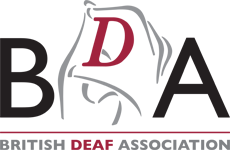OUR WORK IN GOVERNMENT
Pushing for BSL recognition
The BDA is very much at the forefront of pushing for legal recognition of BSL in England, Wales and of BSL and Irish Sign Language (ISL) in Northern Ireland. Scotland is the first country in the UK to pass a BSL (Scotland) Act in Sept 2015. Achieving legal status means that BSL would be protected and promoted in the same way as Welsh and Gaelic languages. This would mean that service providers would be required to produce information and support where appropriate in BSL, giving equal access to services for sign language users and removing many of the commonplace barriers that they currently face, and which result in widespread discrimination.
Without legal status, it remains much easier for companies, council services and other public bodies to continue excluding Deaf people using BSL from having the same access and quality of service as their hearing counterparts. The BDA continues to vociferously participate in and lead in the push for legal status for BSL and ISL across the remaining three nations, using Scotland’s brave example to help ensure that Deaf BSL and ISL users will be recognised as equal citizens. Key achievements and the BDA’s role in each home nation are as follows:
SCOTLAND
- BDA directly supports BSL communities from across all of Scotland to engage with delivery of the BSL National Plan.
- BDA becomes a key partner in the Deaf Sector Partnership to assist in developing the BSL National Plan.
- The passing of the BSL (Scotland) Act which requires local authorities to prepare and publish their own BSL Plans in relation to their own service provision.
- BDA’s Avril Hepner presents evidence to the BSL (Scotland) Bill consultation committee during the passage of the Bill.
- BDA facilitates a Facebook consultation forum to enable the Deaf community to give evidence in their first language to the BSL (Scotland) Bill consultation.
NORTHERN IRELAND
- BDA’s Facebook Consultation enables members of deaf community to give evidence in their first language to the BSL/ISL consultation.
- Members of Northern Ireland’s Legislative Assembly make “pledge” to support the passage of a bill for official BSL/ISL recognition.
- Minister Carál Ní Chuilín announces to Stormont Assembly the start of the consultation into sign language recognition.
- Minister Carál Ní Chuilín makes surprise commitment to begin consultation process for BSL/ISL Bill at BDA 125 Celebration event in Belfast City Hall.
- The Department of Culture, Arts and Leisure Committee considers the findings of the “Roadmap” review, a process to which BDA contributed that outlined the necessary infrastructure support steps for ISL and BSL users and their families.
WALES
- Welsh Assembly Member Jane Hutt states that the Welsh Assembly will use the Disability Equality Forum to look at opportunities in response to a question from Julie Morgan about making BSL an officially recognised language in Wales.
- Welsh Assembly Member Julie Morgan informs BDA she will support the campaign for BSL Act in Wales.
- The Cross Party Group on Deaf Issues agrees to BDA leading the campaign for a BSL Act in Wales and agrees to a formal consultation process similar to Northern Ireland.
- The Welsh Government issues a Written Statement from Carl Sargeant (Cabinet Secretary for Communities and Children) recognising the importance of BSL in ensuring equality of access to services in Wales.
- Welsh Assembly Member Mark Isherwood asks BDA to work with him on leading on a BSL Act (Wales).
ENGLAND
- MP Dawn Butler uses BSL to submit an Early Day Motion to the House of Commons for legal recognition of BSL during the BDA’s Sign Language week 2017.
- The All Party Parliamentary Group on Deafness agree to have a BSL costings enquiry.
- The BDA publishes the “Legal Status for BSL and ISL Report.”
